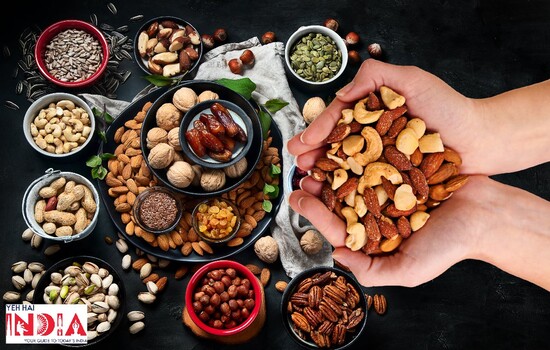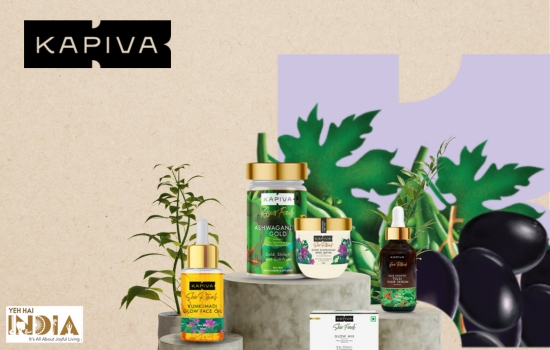Nuts are especially good for improving overall health and reducing the risk of various diseases. In general, all nuts are an excellent source of healthy monounsaturated fats, proteins, fibre, vitamins, minerals, and antioxidants.
Eating more nuts is an easy way to increase fibre intake as many of us don’t get enough fibre from daily meals. Also, many types of nuts are excellent sources of magnesium, a nutrient that helps improve brain function apart from its role in other important bodily functions.
Recommended Story: Oat Milk – The Ultimate Plant-Based Milk for Everyone
Here’s a list of the top 10 tasty healthiest nuts which you should include in your diet.
10 Best Super Healthy Nuts
1. Cashewnuts Nuts
Cashew Nuts are the ones which add that creamy texture to the nice restaurant-style sabzi you make at home. This nut not only provides a creamy texture but is a pool of benefits.
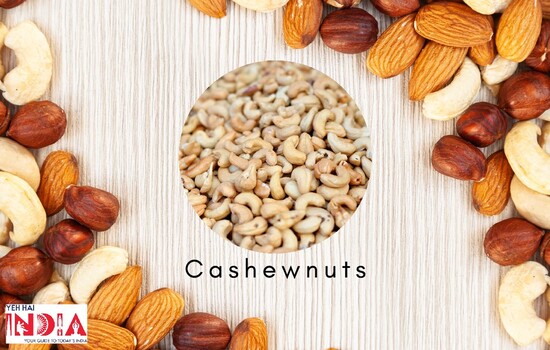
Health Benefits Cashewnuts Nuts
Cashew nuts have more iron than any other nut. Since iron deficiency is common in vegetarians, it becomes vital to include cashew nuts in a vegan diet.
A diet rich in cashew nuts can help improve the symptoms of poor metabolism. They also help in improving blood flow and cardiovascular health.
These nuts contain a good amount of mon-unsaturated fatty acid which helps in decreasing blood glucose levels and increasing insulin production. Cashew nuts also help in skin remineralization and help prevent premature ageing.
Recommended Story – 6 Edible Seeds With Great Health Benefits
2. Pistachios
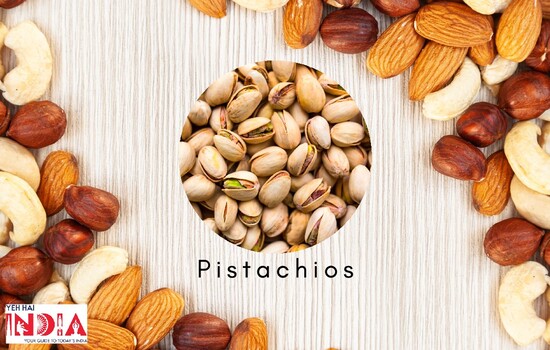
Health Benefits of Pistachios
These little green gems are great snacks and salad toppers because of their high levels of nutrients and antioxidants.
They are one of the nuts with the highest levels of the antioxidants zeaxanthin and lutein, both of which promote eye health.
Pistachios also contain higher levels of fibre (both soluble and insoluble), Vitamin K, phytosterols, alpha-tocopherol and xanthophyll carotenoids.
Due to their high content of bioactive compounds, pistachio nuts represent a rich source of antioxidants including tocopherols, phylloquinone, carotenoids, chlorophyll and flavonoids. These constituents support pistachios being among the top 50 foods in total antioxidant capacity.
Better yet, behavioural studies show that it takes longer to open up the shells of pistachios, so it’s more likely that you’ll eat fewer pistachios.
Pistachios are rich in fibre, and like almonds, help improve cholesterol levels by lowering bad cholesterol and increasing good cholesterol (HDL).
It also helps maintain blood pressure, lose weight, and reduce oxidative stress.
3. Hazelnuts
Hazelnuts are not just delicious, like Nutella, but also an excellent source of vitamin E, copper, manganese, and antioxidants.
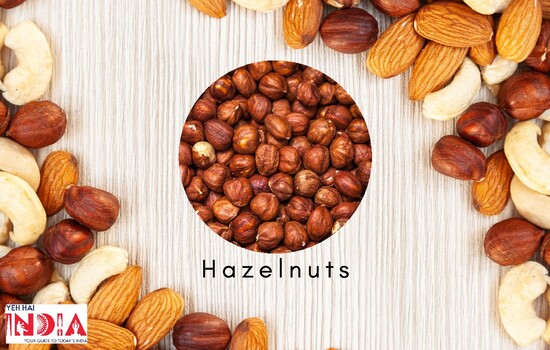
Health Benefits of Hazelnuts
The antioxidants found in these nuts have been shown to help lower cholesterol and improve blood circulation.
Enjoy hazelnuts as a snack, or add roasted hazelnuts to vegetarian dishes, salads, and pasta. Be sure to leave the skin on as it contains the highest levels of antioxidants and vitamins.
Just like other different nuts, hazelnuts have a positive impact on those with coronary heart disease.
Hazelnuts assist in decreasing inflammation and triglyceride levels in the blood. It additionally facilitates better Vitamin E levels inside your blood in conjunction with their cholesterol-lowering quality.
It’s time to skip the store-bought ready-to-eat stuff and treat yourself to these super delicious hazelnuts along with cocoa, and other sweets on occasion.
4. Brazil Nuts
Brazil nuts originate from the trees growing along the banks of the Amazon, Orinoco, Rio Negro and Tapajos rivers in Brazil, Peru and Columbia.
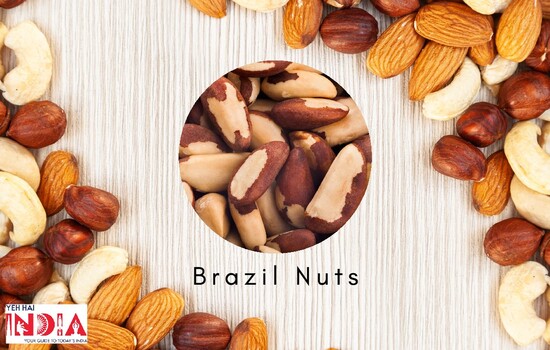
Selenium-rich: These nuts have lots of selenium, a vital mineral required in thyroid hormone manufacturing and antioxidants, another vital micronutrient that helps shield us from cancer.
These nuts are known to be a rich source of selenium, a mineral known for its antioxidant activity. Selenium is used in diverse physical functions like brain function, reproductive function and immune function.
A handful of Brazil nuts offer 100% of the specified day-by-day consumption of selenium.
High omega fats and vitamins: Being richly loaded with omega fats, vitamin E, copper and B vitamins, they are amazing for skin and hair health.
These wonder nuts on regular consumption improve lipid markers, improve lipid metabolism in obese individuals, and improve oxidative stress in diabetic patients.
5. Walnuts
Their shape denotes the brain as they are the ones which are involved in enhancing verbal reasoning as well as improving cognitive and motor functioning in old age.

Rich source of omega-3, 6 fatty acids: Walnuts are sources of major fatty acids, oleic, linoleic and linolenic acids. The most abundant one is omega-6. They also contain a relatively high percentage of a healthy omega-3 fat called alpha-linolenic acid (ALA), while they are the only nuts containing significant amounts of ALA.
Decreases LDL cholesterol: The addition of these brainy-looking halves of walnuts helps significantly decrease total and LDL cholesterol and increase HDL (good) cholesterol. They also help in improving the endocrine parameters in PCOS patients.
Reduces calories: You can have walnuts with oatmeal and banana bread. Eating walnuts helps reduce bad calories and keeps blood flowing through the circulatory system.
6. Peanuts
Peanuts are an easy alternative to nuts but in reality, they belong to the legume family.

They are a great source of protein and also contain various water-soluble and oil-soluble micronutrients.
Yes, you could achieve their blessings via foods like peanut butter, salads or sweets covered with ground peanuts. Keep in mind that peanut butter is excessive in calories, so you have to know the right quantity to maintain a healthy weight.
Numerous Bioactive compounds: With the macro and micronutrients, peanuts also contain bioactive compounds such as phytosterols, phenolic compounds, stilbenes, lignans, and isoflavonoids.
Low-saturated fatty acids and high antioxidants: Peanuts are the most consumed oilseed worldwide, and there is a good reason for that. Peanuts have low saturated fatty acids and also contain high oleic acid and antioxidant capacity and are also a good source of vegetable protein.
Improves HDL cholesterol: Frequent consumption of peanuts is associated with reduced risk of blood cholesterol levels and blood pressure, as well as reduced cardiovascular disease risk.
Peanuts help in improving the HDL cholesterol level and significantly decreasing total and low-density lipoprotein (LDL) cholesterol and triacylglycerol levels.
Regulates sugar levels: Peanuts help in regulating hypoglycemia as well as help in glycemic control. At the same time, the polyphenol rick skin of peanuts also helps inhibit carbohydrate absorption which may also be an additional glycemic control point.
Recommended Intake: According to the Dietary Approach to Stop Hypertension, peanut consumption is recommended 4-5 times a week, which is a sign for us to add them in our salads, as a mid-meal and also in our sabzis and curries.
Recommended Story – Top 10 Benefits of Eating Almonds
7. Almonds

Well, yes, there is a reason for almonds to get so much health hype. Almonds are not only a solid source of fibre and protein but also help reduce inflammation in the body and maintain a healthy weight.
Some of the benefits of these nuts can be attributed to the fact that almonds are rich in vitamin E. One serving covers 60 per cent of your daily needs. Some studies have even linked almond consumption to a reduced risk of developing colon cancer.
Eating almonds helps lower bad cholesterol (LDL), and oxidative stress, all of which hurt heart health. Almonds can be part of your weight loss plan. They also help lower blood pressure in obese people.
To learn in-depth about them go through our article on the benefits of almonds.
8. Pine Nuts
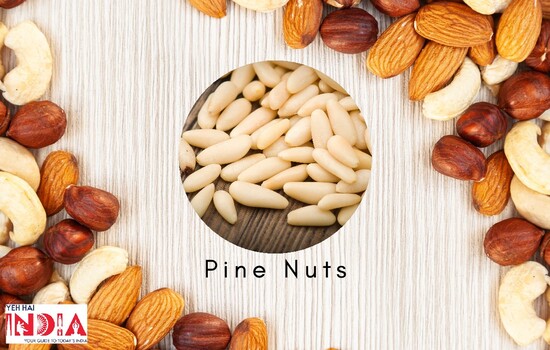
Nutrient-rich: Pine nuts are an excellent source of vitamins E and K as well as iron and magnesium. They contain pinolenic acid which has promising benefits in the prevention of inflammatory disorders.
Health Benefits
Pine nuts help in weight reduction, lipid-lowering and anti-diabetic action as well as help in the suppression of cell invasiveness and motility in cancer.
Delicious recipes: Make pesto with pine nuts or sprinkle them on pasta, chicken, salad, and fish to incorporate this healthy nut into making a healthy meal.
9. Pecans
Pecans are a kind of tree nut widely grown in North America. Thanks to their wealthy nutrient structure and buttery flavour, they`re a common ingredient in desserts, appetizers, and main course dishes.
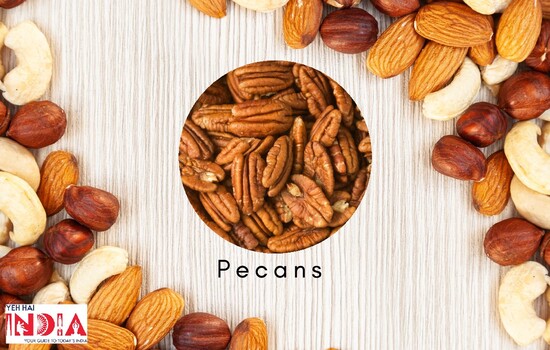
Although they boast of an extended listing of crucial vitamins, they’re additionally packed with energy and fats.
Pecans are rich in some critical vitamins our bodies need to function properly. In particular, they’re a very good source of fibre other than copper, thiamine, and zinc.
These walnut-like nuts are loaded with crucial vitamins and may be a high-quality addition to a well-rounded wholesome diet.
10. Macadamia Nuts
Macadamia nuts used to be native to Australia but nowadays they are cultivated in different parts of the world, including Hawaii, Latin America, Asia and parts of Africa. These are mild in flavour and have a buttery texture.
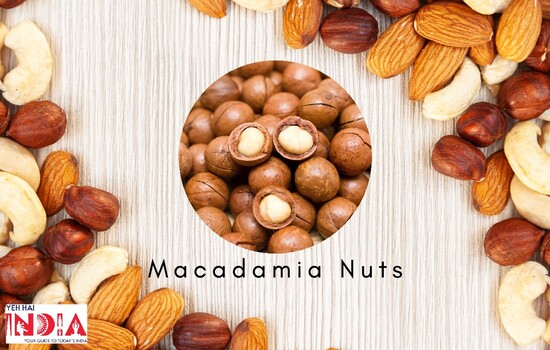
You can eat them raw or add them to your favourite dishes. They are a rich source of monounsaturated fats or omega fats which are known to be beneficial in reducing the risk of heart disease and type 2 diabetes.
Whatever type of nuts you choose can be added to different foods to gain from their versatility in flavour and nutrition.
Chomp on these super healthy nuts daily to tap into their health-advancing features for good health and extended lifespan.
Also, Read – Nutrition Bowls: A Guide To Make Your Own Mini Meal
Frequently Asked Questions
Why are nuts considered a healthy addition to your diet?
Nuts are nutrient-dense foods rich in healthy fats, protein, fibre, vitamins, minerals, and antioxidants. Regular consumption of nuts improves heart health, reduces inflammation, betters brain function and weight management, and lowers the risk of chronic diseases like diabetes and certain cancers.
How many nuts should I include in my daily diet?
The recommended daily intake of nuts varies depending on individual needs and dietary goals. As a general guideline, a serving size of nuts is typically around 1 ounce or 28 grams, which is equivalent to a small handful. It’s important to keep in mind that nuts are calorie-dense, so moderation is key, especially if you are watching your overall calorie intake.
Are all nuts equally healthy, or are some better than others?
While all nuts are nutritious, some varieties offer specific health benefits due to their unique nutrient composition. For instance, almonds are rich in vitamin E and calcium, walnuts are high in omega-3 fatty acids, Brazil nuts are a great source of selenium, and pistachios are packed with potassium. Choose the nuts you enjoy and rotate them for maximum nutritional diversity.
Can nuts be part of a weight loss diet?
Yes, nuts can be part of a weight-loss diet when consumed in moderation. Although nuts are energy-dense, their combination of healthy fats, protein, and fibre helps promote feelings of fullness and satiety, which can prevent overeating. The key is to practice portion control and be mindful of your overall calorie intake.
Are roasted or raw nuts better for you?
Both roasted and raw nuts have their advantages. Raw nuts are a great choice because they retain their natural nutrients and healthy fats. When roasting nuts, it’s important to avoid excessive use of oil or added salts and sugars, as these can negate some of the health benefits. If you opt for roasted nuts, consider dry roasting them at home or choosing options that are lightly roasted and unsalted to maximize their nutritional value.


